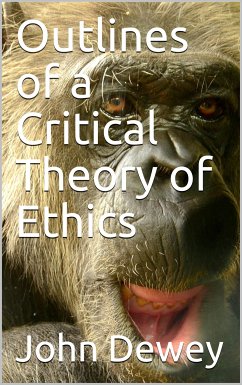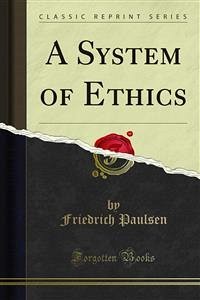Although the following pages have taken shape in connection with class-room work, they are intended as an independent contribution to ethical science. It is commonly demanded of such a work that its readers shall have some prefatory hint of its sources and deviations. In accordance with this custom, I may state that for the backbone of the theory here presented—the conception of the will as the expression of ideas, and of social ideas; the notion of an objective ethical world realized in institutions which afford moral ideals, theatre and impetus to the individual; the notion of the moral life as growth in freedom, as the individual finds and conforms to the law of his social placing—for this backbone I am especially indebted to Green's 'Prolegomena to Ethics', to Mr. Bradley's 'Ethical Studies', to Professor Caird's 'Social Philosophy of Comte' and 'Critical Philosophy of Kant' (to this latter book in particular my indebtedness is fundamental), and to Alexander's 'Moral Order and Progress'. Although I have not been able to adopt the stand-point or the method of Mr. Spencer, or of Mr. Leslie Stephen my obligation to the 'Data of Ethics' and to the 'Science of Ethics' (especially to the latter) is large.
As to the specific forms which give a flesh and blood of its own to this backbone, I may call attention to the idea of desire as the ideal activity in contrast with actual possession; to the analysis of individuality into function including capacity and environment; to the treatment of the social bearings of science and art (a point concerning which I am indebted to my friend, Mr. Franklin Ford); to the statement of an ethical postulate; to the accounts of obligation, of moral rules, and of moral badness.
While the book is an analysis, in outline, of the main elements of the theory of ethics rather than a discussion of all possible detailed questions, it will not be found the less fitted, I hope, to give a student an idea of the main methods and problems of contemporary ethics. Other teachers, indeed, may agree that a general outline is better than a blanket-mortgage spread over and forestalling all the activity of the student's mind.
As to the specific forms which give a flesh and blood of its own to this backbone, I may call attention to the idea of desire as the ideal activity in contrast with actual possession; to the analysis of individuality into function including capacity and environment; to the treatment of the social bearings of science and art (a point concerning which I am indebted to my friend, Mr. Franklin Ford); to the statement of an ethical postulate; to the accounts of obligation, of moral rules, and of moral badness.
While the book is an analysis, in outline, of the main elements of the theory of ethics rather than a discussion of all possible detailed questions, it will not be found the less fitted, I hope, to give a student an idea of the main methods and problems of contemporary ethics. Other teachers, indeed, may agree that a general outline is better than a blanket-mortgage spread over and forestalling all the activity of the student's mind.









